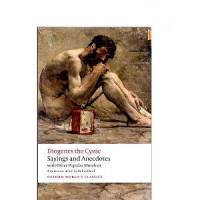Table of Contents
<html>
<a href=“http://lucianofsamosata.info/wiki/doku.php?id=submission_page”><img src=“http://lucianofsamosata.info/images/contact.png” /></a>
</html>
Review: Diogenes the Cynic - Sayings and Anecdotes
<html><p xmlns:dct=“http://purl.org/dc/terms/”><a rel=“license” href=“http://creativecommons.org/publicdomain/mark/1.0/”><img src=“http://i.creativecommons.org/p/mark/1.0/88x31.png” style=“border-style: none;” alt=“Public Domain Mark” /></a><br />This work (by <a href=“https://lucianofsamosata.info/wiki” rel=“dct:creator”>https://lucianofsamosata.info/wiki</a>), identified by <a href=“http://meninpublishing.org” rel=“dct:publisher”><span property=“dct:title”>Frank Redmond</span></a>, is free of known copyright restrictions.</p></html>
Authored by Frank Redmond, 2012
Much of Ancient Cynicism can be encapsulated in the phrase “Coming to see the world as it is…”. Diogenes and his entourage made it the objective of their lives to provide an honest (parrhesia), prophetic, and corrective assessment of the world as they saw it - prideful, misguided, ill, clouded. The Cynics' job was to show others how to “See the world aright” and begin living in accordance with Virtue. This is the only way to begin to cure the ailments of the world. If much of this seems to have commonalities with religious sects and their message, it is no mistake - Cynicism was a missionary philosophy (though not religious by any means).
It is critical to understand the Cynics and Diogenes if you want to understand ancient thought. Traditionally, ancient philosophy has focused on the “big” philosophers like Socrates, Plato, and Aristotle, but that is doing a disservice to many other thinkers whose influence was quite extraordinary in its own light. Aristippus, who is part of this volume and compliments Diogenes and his Cynic gang, is a very good example of a lesser known philosopher who had a profound influence (think Epicurus) and is interesting in his own way. If Ancient Philosophy was more about lifestyle (as Pierre Hadot would have it) than theory, Cynicism is a perfect example of a _living_ philosophy. See his work here: What Is Ancient Philosophy? by Pierre Hadot
The Cynic perspective can be glimpsed from looking at some of the section titles of this brilliant (and brave) compilation from Oxford World Classics: The Sage as Beggar, A Shortcut to Philosophy and Virtue, The World of Illusion, Politicians and Rulers, Diogenes as Wit, Old Age & Death, amongst others. Because the book is constructed using aphorisms and segments of works, it makes good sense to categorize the pieces into sections like these, and it really streamlines the message of Cynicism a great deal. Oxford has done a fantastic job in this volume of getting to the root of what Cynicism is all about without resorting to becoming a secondary source book. The material is made from actual quotes and snippets from the Ancient Authors themselves. The end notes of the volume are essential to grasping an understanding of the text and it is recommended that the reader cross-reference with the end notes for each passage.
When I first saw this volume being produced, it was exciting to see a publishing house coming out with Cynic material instead of the next translation of the Iliad. We have enough Iliads; we need more volumes like this one. The Iliad is a great read, but reading about a figure like Diogenes is just as pleasurable. It may just change your life.
You can buy the text from any of these links:
Kindle: Kindle Version Link
Paperback: Amazon Paperback Link
Barnes and Nobles: Barnes and Nobles Link
Info: Library Thing - http://www.librarything.com/work/12570430
Read more about the Cynics and Diogenes: Lives & Writings on the Cynics
